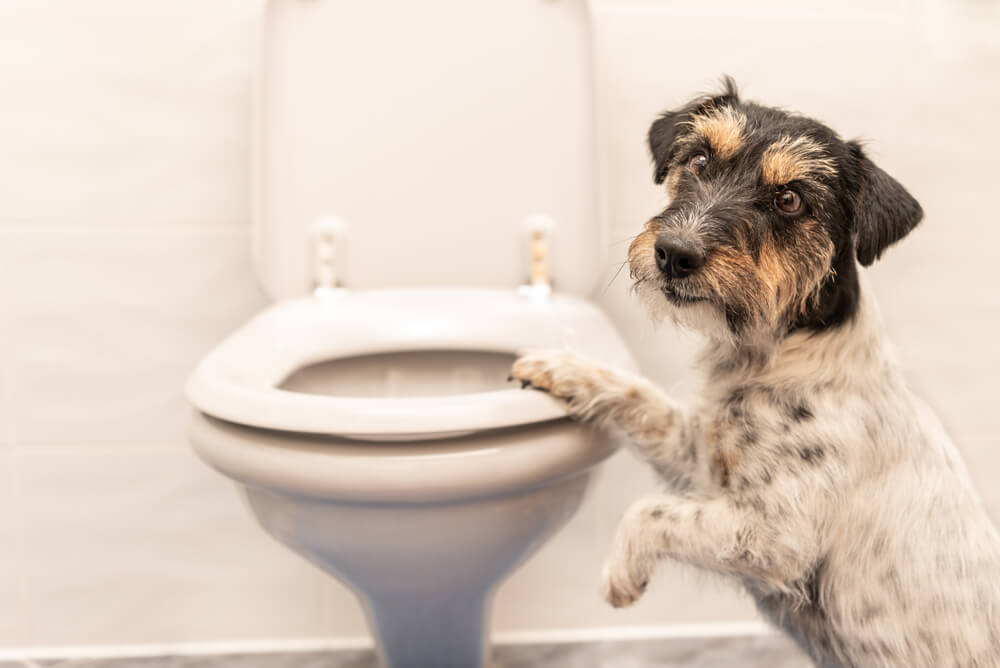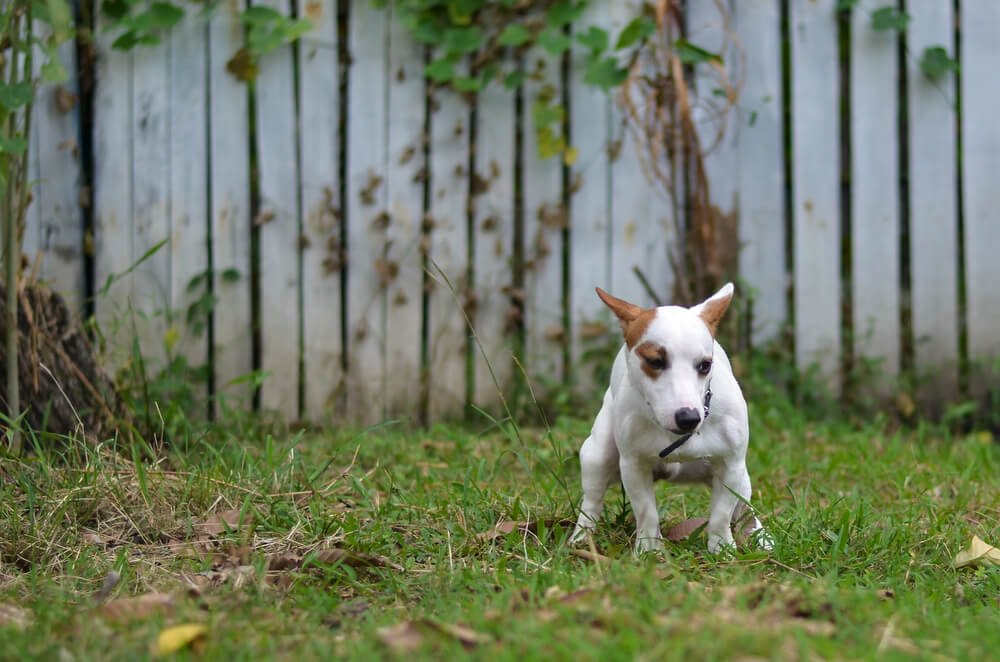Diarrhea is a very common problem in our canine friends and many dog owners will be familiar with dealing with doggy tummy upsets. Multiple factors can cause diarrhea in dogs and most cases will resolve in a few days to a week. However, some cases of diarrhea can last longer and it can become a chronic issue (lasting over 3 weeks). We’ll talk through some of the common causes of chronic diarrhea in dogs and what you can do to treat your pooch at home.
What is Diarrhea?

Diarrhea can be anything from slightly softer to very liquid poops and it may or may not contain blood or mucus.
Diarrhea is when your dog’s poop isn’t as solid as it should be. This occurs from decreased absorption of water, nutrients, and electrolytes and faster transit time through the gastrointestinal system. It isn’t a disease in itself, it’s a symptom alerting you that there’s something wrong with your dog’s tummy.
Diarrhea can be anything from slightly softer to very liquid poops. It may or may not contain blood or mucus. There might be other symptoms accompanying diarrhea e.g. weight loss, vomiting, and stomach pain. We normally divide diarrhea into two categories depending on where in the intestines the diarrhea is occurring; small intestinal diarrhea or large intestinal diarrhea.
Characteristics of Small Intestinal Diarrhea include:
- Watery loose feces
- Presence of dark blood (melena)
- Large amount of feces
- Weight loss
Characteristics of Large Intestinal Diarrhea include:
- Loose or semi-solid feces
- Presence of fresh blood (hematochezia)
- Small amount of feces
- Increased urgency
- Mucous
- Straining to poop (tenesmus)
When is Chronic Diarrhea?

Apart from causing potential pain and discomfort, chronic diarrhea also means that your dog may not be absorbing all the essential nutrients in their food.
Diarrhea is classified as chronic diarrhea when it hasn’t resolved within 2-3 weeks. It can be severe diarrhea that is debilitating or mild diarrhea that isn’t affecting your dog too much. Either way, if it’s been going on for a few weeks then that’s too long. It’s important to resolve the diarrhea so your dog can get back to normal. To do this, we need to know what has caused the diarrhea.
What Causes Chronic Diarrhea in Dogs?
As you can imagine, it’s not comfortable for your dog to have diarrhea for a long period of time. Apart from causing potential pain and discomfort, it also means that your dog may not be absorbing all the essential nutrients in their food. This could cause a poor quality, dry coat, and lethargy in your dog. We want our dogs to be in tip-top shape so it’s important to get them better. Firstly we need to figure out what’s causing their case of diarrhea.
There are many, many causes of diarrhea in dogs. In this article, we’ll focus on what causes chronic diarrhea. Potential causes of your dog’s chronic diarrhea could be (but aren’t limited to);
- Diet
- Allergies
- Parasites
- Inflammatory bowel disease
- Liver or kidney issues
- Pancreatitis or EPI
- Bacterial overgrowth
- Cancer
- Stress
There are other causes of diarrhea such as viral causes and dietary indiscretion (eating something they shouldn’t like garbage) but these usually cause acute diarrhea. Out of all the causes of chronic diarrhea, diet is a very common cause.
Being on a poor quality diet can cause your dog’s gastrointestinal system to be irritated which can cause diarrhea. Diets with a long list of ingredients, poor protein sources, and high amounts of carbohydrates can contribute to diarrhea. Along with this, poor quality diets that are very high in carbohydrates could lead to overeating and obesity. Obesity can predispose dogs to multiple chronic inflammatory conditions and should be prevented at all costs.
Your dog’s diet can also cause diarrhea if your dog has food allergies or sensitivities. Dogs can be allergic to many ingredients and it can take time to find out what ingredient your dog is reacting to. Poorer quality diets generally have many ingredients and this can make it more difficult to rule out allergens along with exposing your dog to many different potential allergens.
How Can Chronic Diarrhea in Dogs be Treated at Home?

Prebiotics and probiotics can help with cases of diarrhea by promoting good bacteria in the gastrointestinal tract.
If your dog has had mild diarrhea for a few weeks, there are a few home remedies that you can try at home. Feed them bland food until the diarrhea settles. Once their tummy has settled, transition them onto a limited ingredient dog food that is high in protein and low in carbs to optimize their gut health.
Prebiotics and probiotics can help with cases of diarrhea by promoting good bacteria in the gastrointestinal tract. If you decide to try these, ensure that you source high quality products, ideally recommended by your veterinarian.
Fiber supplements such as psyllium husk or tinned pumpkin can help to firm up softer feces in cases of diarrhea. Discuss this with your veterinarian first as this won’t be appropriate for all dogs.
Rule out any causes of stress or anxiety for your dog as this can contribute to the problem (note that stress can cause a multitude of other issues, such as stress colitis). Keep your dog up to date with worming treatment from your veterinary clinic. It’s very important to never give your dog any human medication as many of these are toxic or poisonous to dogs.
When to Visit Your Vet

Causes of concern include symptoms such as weight loss, vomiting and lethargy, just to name a few.
A bland diet along with probiotics or fiber supplements will likely resolve mild diarrhea that’s been caused by a dietary change or sensitivity. However, if the diarrhea continues after this you should book a visit with your veterinarian. Other causes of concern would include symptoms such as:
- Weight loss
- Vomiting
- Lethargy
- Reduced appetite
- Increased drinking and urination
- Painful abdomen
Your vet will need to examine your dog for any signs of underlying illness. They might check a fecal sample to rule out parasites or blood tests to check for underlying liver or kidney disease. Extra blood tests such as folate, cobalamin, cPLI, and TLI can be helpful to check for pancreatic and intestinal diseases. X-rays might be required to check for foreign bodies (objects that might be stuck in the intestines or stomach) and tumors.
Once they’ve diagnosed the cause of the diarrhea they can prescribe medication to help your dog. It’s important not to ignore chronic diarrhea that isn’t responding to diet change as it could need specific treatment e.g. inflammatory bowel disease may require corticosteroids.
Conclusion
Chronic diarrhea can be a debilitating condition for your canine friend to have. It’s important to find out what’s causing their tummy upset and common causes include diet problems, allergies, inflammatory bowel disease, and underlying disease (e.g. kidney disease). Trialing a bland diet at home can help many cases of diarrhea but if it isn’t resolving you should see your veterinarian. They will rule out common causes of chronic diarrhea and might need to prescribe medication for your dog. Ensure that you keep your dog on a high quality diet to avoid potential dietary issues.
Frequently Asked Questions:
What causes persistent diarrhea in dogs?
There are many causes of chronic diarrhea in dogs including poor diet, food allergies, stress, parasites, inflammatory bowel disease, and underlying disease e.g. kidney disease.
Why won’t my dog’s diarrhea go away?
If your dog’s diarrhea has occurred for over 3 weeks then it’s classed as chronic diarrhea. Causes include poor diet, allergies, inflammatory bowel disease, and underlying disease.
What can I give a dog for chronic diarrhea?
You can try feeding your dog a bland diet, supplements such as prebiotics, probiotics, and pureed pumpkin can also help.



